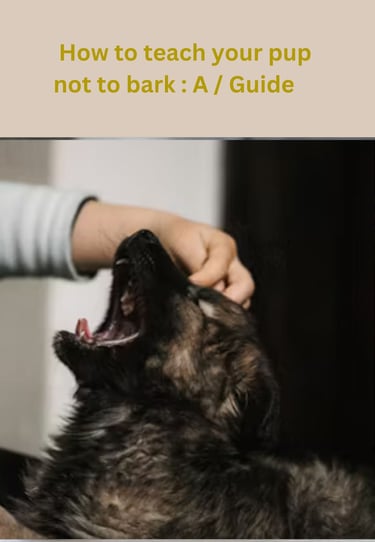puppy train tips for beginners puppy crate training for separation anxiety
puppy train tips for beginners. <h1>Puppy Training Tips for Beginners: Housebreaking and Socialization</h1> <p>Puppy training is an essential part of raising a well-behaved puppy. Here are some puppy training tips for beginners, including housebre


The Science of Puppy Learning
Understanding how puppies learn is essential for effective training and proper care. The learning process in canines is governed by several foundational theories: classical conditioning, operant conditioning, and social learning.
Each of these theories illustrates a different mechanism through which puppies acquire new behaviors and responses to various stimuli in their environment.
Classical conditioning, first described by Ivan Pavlov, involves associating a neutral stimulus with an unconditioned stimulus to elicit a response.
For example, when a puppy hears a bell ring before receiving food, it begins to associate the sound with mealtime, eventually salivating in response to the bell alone.
This type of learning demonstrates how environmental cues can influence a puppy's behavior and expectations.
On the other hand, operant conditioning, as explored by B.F. Skinner, focuses on the consequences of a puppy's actions. By using rewards or punishments, trainers can shape a puppy's behavior.
For instance, rewarding a puppy with treats or praise when it obeys commands encourages the repetition of desirable behaviors. This method emphasizes the importance of consistency and timing in training sessions to ensure successful learning.
Social learning theory highlights the significant role that observation plays in a puppy's learning process. Puppies often learn by watching and imitating the behavior of other dogs and humans.
This aspect is particularly important during the critical periods of development, which occur from birth to approximately six months of age.
During this time, puppies are most receptive to socialization experiences, allowing them to learn essential skills and behaviors that will benefit them throughout their lives.
By understanding these learning principles, owners can create a positive and effective training environment that caters to their puppy's cognitive abilities, leading to a well-adjusted and obedient canine companion.
Factors that Influence Puppy Learning
The learning process of a puppy is a multifaceted phenomenon significantly impacted by various factors. Understanding these influences can enhance training outcomes and strengthen the bond between owner and pet.
One of the primary elements is genetics, as inherited traits can determine a puppy's temperament, energy level, and responsiveness to training.
Different breeds exhibit distinct learning capabilities; for example, working breeds often excel in tasks requiring intelligence and physical exertion compared to more laid-back breeds.
Recognizing these breed characteristics is essential for tailoring training approaches that maximize learning potential.
The environment in which a puppy grows and learns plays a crucial role in its development. A supportive and positive training environment fosters confidence and eagerness to learn. Conversely, environments that are overly distracting or stressful can hinder a puppy's ability to absorb information.
Early socialization—the process of exposing a puppy to various experiences, sounds, people, and other animals—is integral to a well-rounded dog.
Proper socialization enhances a puppy's comfort in new situations, enabling it to adapt quicker and learn more effectively.
Owner training methods are also pivotal in shaping a puppy's learning experience. Positive reinforcement techniques, such as treats, praise, or playtime, can motivate puppies to repeat desired behaviors, making the learning process enjoyable for them.
In contrast, negative reinforcement can cause fear or anxiety, negatively impacting the learning experience.
Different puppies may respond differently to various forms of motivation, highlighting the need for individualized training strategies.
By understanding and implementing these factors, owners can create a conducive atmosphere for effective puppy learning, ultimately leading to a well-adjusted and obedient canine companion.
Effective Training Techniques for Puppies
When it comes to successfully training a puppy, understanding how they learn is crucial. Among the most effective methods are clicker training and positive reinforcement. Clicker training involves the use of a handheld clicker that emits a sound when a puppy performs a desired behavior.
This sound serves as a clear indicator to the puppy that they have done something right, followed by an immediate reward, typically in the form of treats or praise.
Using a clicker helps reinforce the behavior and enhances learning, as puppies quickly associate the click with positive outcomes.
Positive reinforcement is another powerful technique that encourages desirable behavior through rewards. This can include treats, verbal praises, or physical affection.
For example, when a puppy sits on command, rewarding them immediately with a treat reinforces that action, making them more likely to repeat it in the future. It is essential to ensure that rewards are given during the initial stages of training to establish a clear connection between the action and the reward.
Establishing a structured routine aids in the learning process. Puppies thrive on consistency; hence, training sessions should occur at the same times each day.
Keeping sessions short, around 5-10 minutes, makes training more manageable for both the puppy and the owner, while also maintaining their focus.
Regular practice not only helps solidify learned behaviors but also promotes a sense of security in the puppy.
Avoidance of punishment-based training is vital to ensure a puppy's emotional well-being. Techniques that incorporate aversive reactions can lead to fear and anxiety, ultimately hindering the animal's learning capabilities. It is crucial for trainers to exhibit patience and encouragement so that the puppy feels safe and motivated to participate in training sessions.
Ultimately, making training an enjoyable experience for both the puppy and the owner fosters a stronger bond and facilitates a more effective learning environment. Emphasizing fun during training sessions will keep the puppy engaged and eager to learn new commands, solidifying their skills as they grow.
Common Learning Challenges and Solutions
Training a puppy is an exciting journey, yet it often presents various challenges that can impede the learning process. Distractions in the environment, such as loud noises, other animals, or unfamiliar people, can significantly divert a puppy's attention away from the task at hand.
It is essential for owners to understand that puppies are naturally curious and exploratory; thus, managing their environment to minimize distractions is crucial.
Using a quiet area for training sessions and gradually introducing more stimulating environments can help improve focus.
Fear is another common issue encountered during puppy training. Puppies may experience fear in novel situations or environments, and this can lead to avoidance behaviors. To address this, owners should implement positive reinforcement strategies.
Gradually exposing the puppy to different experiences while pairing them with treats or praise can help build confidence.
Recognizing signs of fear, such as cowering or barking, enables owners to intervene appropriately and provide reassurance.
Behavioral issues, including excessive barking or chewing, often arise from a lack of structure or boredom. Offering consistent routines and engaging toys can mitigate these behaviors.
It is important for owners to redirect unwanted behaviors towards acceptable outlets, ensuring the puppy remains mentally and physically stimulated. Creating a structured schedule that includes playtime, training, and socialization can enhance the learning experience.
Additionally, understanding the signs of stress or anxiety in puppies can significantly enhance their training journey. Symptoms may include panting, pacing, or hiding.
A safe learning environment is vital; thus, establishing a designated space where the puppy feels secure is beneficial.
Lastly, the importance of ongoing education for both the puppy and owner cannot be overstated.
Participating in training classes can foster a collaborative learning experience that strengthens the bond between them, leading to a more harmonious relationship.
By addressing these challenges with patience and understanding, owners can effectively facilitate their puppy's learning journey.











